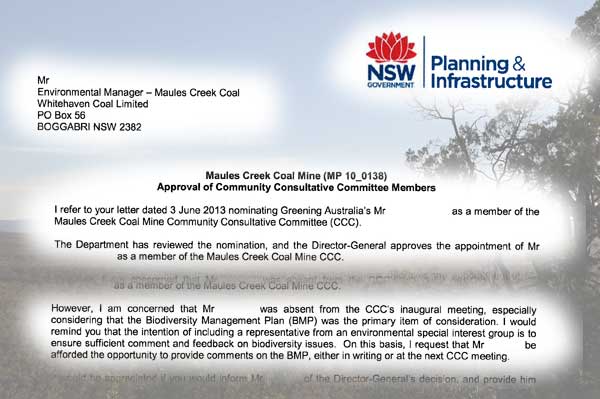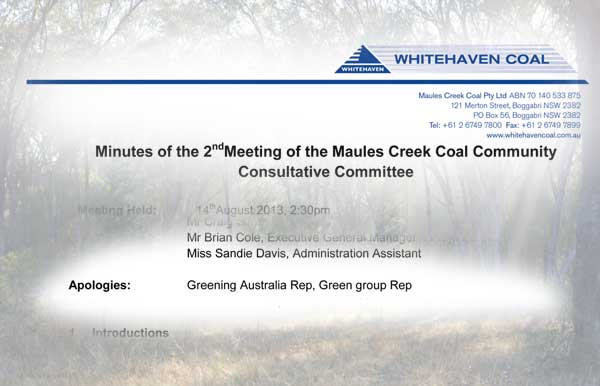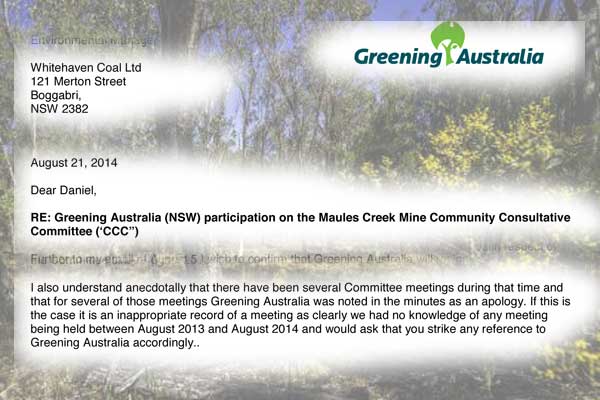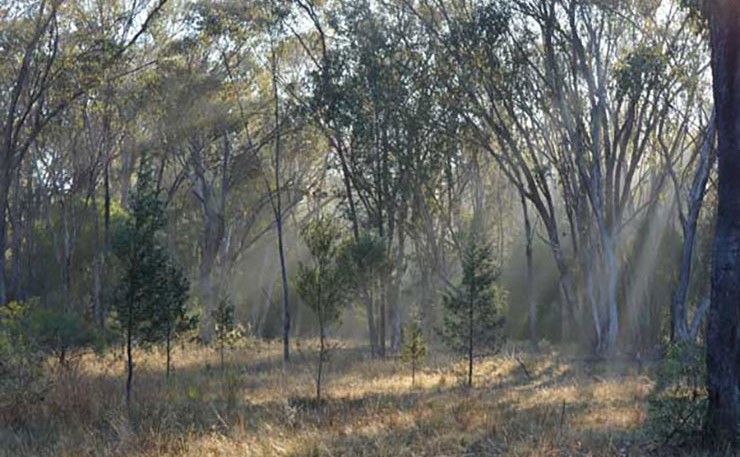The NSW Government is investigating the presence of a ‘ghost’ green group after revelations mining giant Whitehaven Coal has been operating a key consultation panel without environmental oversight for more than a year.
That panel – the Maules Creek Community Consultative Committee (CCC) – signed off on a Biodiversity Management Plan (BMP) which is now the subject of an ongoing legal battle.
The plan, environmentalists say, does not adequately protect one of the nation’s most vulnerable ecosystems from the open-cut coal project, and did not provide proper avenues for community consultation.
Documents obtained by New Matilda reveal that Whitehaven Coal was directed by the Department of Planning & Environment (DoPE) in June last year to ensure it had suitable environmental representation on the community panel for the $767 million coal project.
A senior official, writing on behalf of the Director General of DoPE, warned Whitehaven Coal “that the intention of including a representative from an environmental special interest group is to ensure sufficient comment and feedback on biodiversity issues”.
The DoPE was concerned after it learned Whitehaven’s nominated environmental group, Greening Australia, had not shown up to the inaugural meeting of the Maules Creek CCC, where the Biodviersity Management Plan (BMP) was the main topic of discussion.
The DoPE directed Whitehaven to ensure that Greening Australia “be afforded the opportunity to provide comments on the BMP, either in writing or at the next CCC meeting”.

More than a year down the track, the company’s published minutes reveal no environmental group has ever attended a single meeting of the Maules Creek CCC.
But further documents obtained by New Matilda reveal that those minutes record Greening Australia as having offered its apologies for non-attendance.

Greening Australia says it has never, on any occasion, given apologies for not attending meetings with Whitehaven, because it never even knew the meetings were being held.
In a scathing letter to Whitehaven Coal dated August 21, 2014, a copy which has been obtained by New Matilda, a senior Greening Australia official says he is “extremely disappointed” with Whitehaven Coal’s conduct and formally resigns from the Maules Creek CCC, describing the minutes as “an inappropriate record” on the grounds that “Greening Australia was noted in the minutes as an apology”.
“… Clearly we had no knowledge of any meeting being held between August 2013 and August 2014 and would ask that you strike any reference to Greening Australia accordingly,” the official writes.

Whitehaven Coal is chaired by former Deputy Prime Minister Mark Vaile, the long-time Nationals member for the seat of Lyne, on the north coast of NSW.
The Maules Creek CCC is chaired by Vaile’s former National Party colleague, John Turner, a one-time NSW shadow minister for mining whose state seat overlapped Vaile’s.
Mr Turner did not respond to repeated requests for an interview with New Matilda, nor did he respond to a detailed list of questions about how the minutes came to wrongly record apologies from Greening Australia.
A spokesperson for Whitehaven Coal also declined to explain the discrepancy, but issued a written statement defending the company.
“We have written to the Department to explain our position on this matter, as is proper under the circumstances,” the spokesperson said.
“It is appropriate that the Department consider the company’s position and we will continue to work closely with them to ensure that our community consultation obligations are being met.
“Maules Creek has been through one of the most intense and rigorous processes of regulatory, legal and public scrutiny for a project of its size. Any suggestion to the contrary is wrong.”
NSW Greens parliamentarian, David Shoebridge has written to the NSW Minister for Planning & Environment, Pru Goward demanding that operations at Whitehaven Coal cease until the issue is resolved.
“Where, as here, there is evidence of systemic failure in the implementation of a key planning condition it is essential that you, as Minister, intervene to halt the operations of this mine until this matter is addressed,” Mr Shoebridge wrote.
“This would of necessity require an independent inquiry into the failings of the [Maules Creek] CCC and scrutiny of the decisions of the CCC given the prima facie evidence [of a discrepancy]and failure to comply with the directions and conditions issued by the Department of Planning.”
The Maules Creek mine, still under construction, will fall within the Leard State Forest in the north west of NSW, a wilderness area that is home to the largest remaining patch of critically endangered Box-Gum Grassy Woodland in NSW, an ecosystem of which just 0.01 per cent remains.
Whitehaven’s troubled Biodiversity Management Plan (BMP) has hit more than just a political hurdle over the disputed minutes. The BMP is now facing a three-pronged attack – in the NSW parliament, in the courts, and on the ground, where environmentalists, activists, farmers and local residents have maintained a protest camp for more than two years, with almost 250 arrests.
Local community group – Maules Creek Community Council – has commenced legal proceedings in the Land & Environment Court, arguing that threatened species are “likely to be slaughtered in their nests” because under the BMP, Whitehaven is seeking to clear the forest at a time when fauna are at their most vulnerable.
“The question is: Why is the miner applying for, and the DoPE considering, allowing clearing in spring for this year, when they accept that in the future it is not acceptable to clear at that time?” the group said in a written statement issued earlier this week.
“Is the NSW Government changing the rules to allow unnecessary harm to threatened species to suit a coal mining company?”
The open cut mining project has also come under assault from environmentalists, who say the Leard should be off-limits to mining.
Ecologist Phil Spark has studied the Leard State Forest extensively. He told New Matilda that the region was “unique” and “irreplaceable”.
“The 28 threatened species known to occur (in the Leard State Forest) is a very high number, higher than that found in many of our National Parks,” Mr Spark said.
“The reason it’s so high is because many of the species are dependent on the Box–Gum Grassy Woodland.”
Local residents have also raised concerns about the DoPE’s failure to ensure proper compliance.
Peter Watson, a local farmer who serves on the Maules Creek CCC said the Department of Planning & Environment needs to ensure that due process is followed when changes are made to the mine’s Management Plans.
“If there is a requirement for an environmental representative on the CCC then the planning department compliance team needs to ensure that a proper person is appointed, and ultimately that they be present.”
Nic Clyde, a senior climate campaigner with Greenpeace Australia agrees that Leard boasts enormous biodiversity value. He was scathing of the approval process for Maules Creek, saying it was now “so mired in questions” that construction for the mine should cease while the process is audited.
“NSW Planning and Environment and Whitehaven Coal are both responsible for this debacle,” Mr Clyde said.
“There’s a very good reason why an environment group should have been represented on the CCC. The Leard State Forest is a sensitive environmental area that 85 per cent of the NSW community thinks should be out of reach to coal miners.”
“This is a project that should never have been allowed.”
New Matilda’s investigation into Whitehaven Coal and the operations of the Maules Creek Mine will continue next week.
– Additional reporting by Chris Graham
New Matilda is an independent publication. We rely primarily on subscriptions from our readers to bring you this sort of journalism. You can help fund New Matilda here.
Donate To New Matilda
New Matilda is a small, independent media outlet. We survive through reader contributions, and never losing a lawsuit. If you got something from this article, giving something back helps us to continue speaking truth to power. Every little bit counts.




